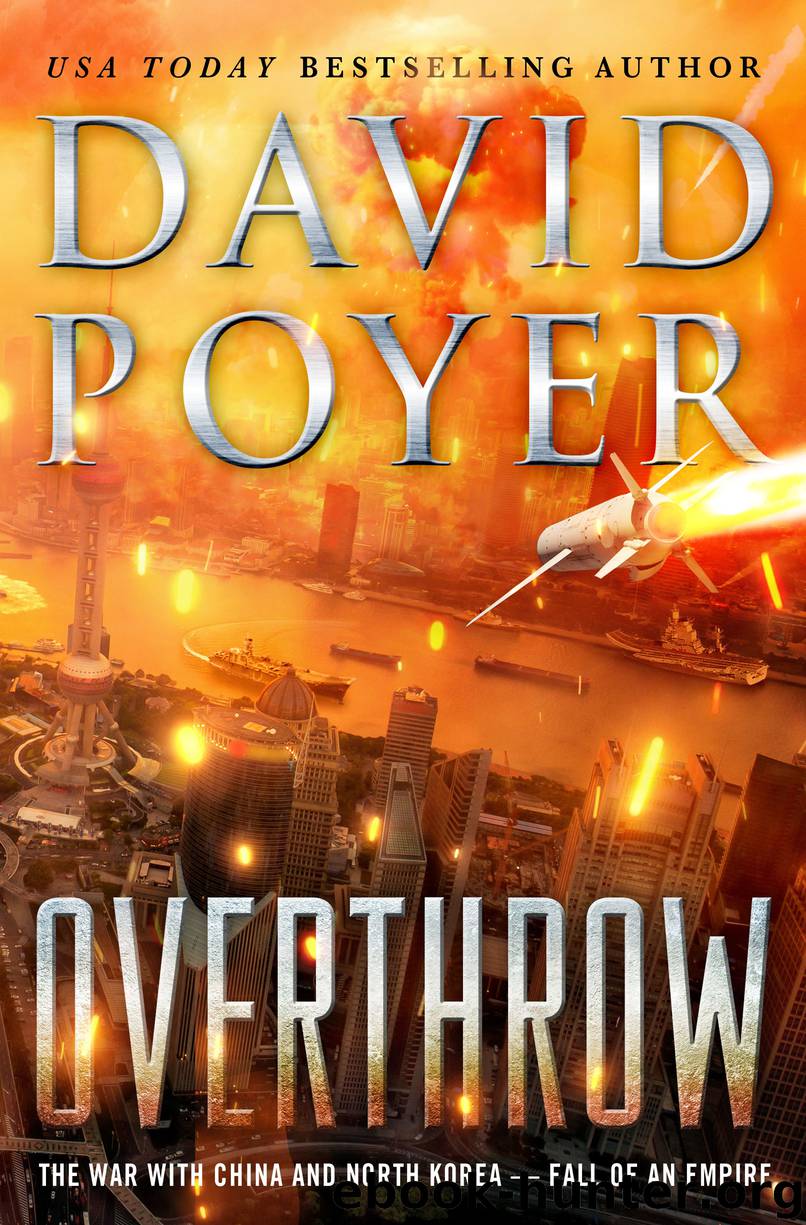Overthrow: The War with China and North Korea by David Poyer

Author:David Poyer
Language: eng
Format: epub
Publisher: St. Martin's Publishing Group
* * *
THE reception that night was in the Gallery, catered by a hotel restaurant reputed one of the best in Europe. Its floor-to-ceiling windows opened on a stone-flagged terrace that overlooked the lake far below. Blair had dressed carefully, a black scoop-necked dress with Louboutin heels and a two-strand necklace of royal amber.
She remembered a previous reception, in the Throne Room in Dublin Castle. Tonight, much like then, elegantly attired women and nattily dressed men mixed and chatted. She glimpsed Liz McManus, the Irish delegate who’d invited her, deep in conversation with a petite woman in a sari. Then spotted a dignified African gentleman, late seventies or early eighties, gray tufts seeded like rows of corn across an otherwise naked temple. As their gazes met he bowed slightly.
“Is that him?” Salyers murmured, above the hubbub.
Blair nodded. She’d briefed Shira about the contact in Dublin. The old African had slid a message to her beneath a cup of tea. Acting as go-between for the Chinese. Whom Blair had then met, at a pastry shop, for a curiously contradictory conversation.
Salyers had subjected her to a good half hour of alternating reproaches—on how she hadn’t pressed for concessions, elucidated credentials, set up a follow-up meeting—and then advice—about how to respond to a diplomatic feeler in an informal setting. The key takeaway had been how dangerous such a contact was, how cautiously it must be handled. “Above all, don’t commit yourself, or us,” Salyers had warned. “You don’t have the power. More critically, you don’t have the trust.”
Blair had nodded. “Okay.”
“Remember this. A private feeler serves three functions. One: as a signal. Two: it can permit concessions on the other side. And three: it serves what we call a ‘screening function.’ The way you respond to the contact gives both parties the opportunity to earn trust. How do you earn it? Mainly, by not leaking.
“You can’t negotiate if you don’t trust your adversary. At least, to some extent. Since they contacted you again, that demonstrates some confidence. Possibly,” Salyers hesitated, “and I may be wrong about this, but perhaps because they think you’re linked to what could be seen these days as the peace party.”
“Linked to … Shira, I’ve never advocated peace without some kind of permanent settlement. We don’t have to have a victory parade. But we need to fight long enough to make it clear to the Opposed Powers they’re beaten. And there has to be regime change. Progress toward democracy. Otherwise”—she thought of Szerenci—“We’ll be doing this all over again twenty years down the road.”
So now she nodded, and drifted toward the old man as Salyers headed in another direction. He smiled and bowed again, a twinkle in his eye.
Of course, she’d looked him up. “Minister Madubuike. How nice to see you again.”
He looked over her shoulder, still smiling vaguely. Barely flicked his gaze across her face; then turned away.
She halted, unsure what was going on. Then noticed more and more of the delegates drifting away from her. And from
Download
This site does not store any files on its server. We only index and link to content provided by other sites. Please contact the content providers to delete copyright contents if any and email us, we'll remove relevant links or contents immediately.
In Control (The City Series) by Crystal Serowka(36228)
The Wolf Sea (The Oathsworn Series, Book 2) by Low Robert(35249)
We Ride Upon Sticks by Quan Barry(34536)
Crowbone (The Oathsworn Series, Book 5) by Low Robert(33623)
The Book of Dreams (Saxon Series) by Severin Tim(33384)
The Daughters of Foxcote Manor by Eve Chase(23628)
Trainspotting by Irvine Welsh(21665)
Call Me by Your Name by André Aciman(20515)
The Secret History by Donna Tartt(19088)
Shot Through The Heart (Supernature Book 1) by Edwin James(18926)
All the Missing Girls by Megan Miranda(16026)
American King (New Camelot #3) by Sierra Simone(15888)
The Girl from the Opera House by Nancy Carson(15785)
Pimp by Iceberg Slim(14506)
Sad Girls by Lang Leav(14423)
The Betrayed by Graham Heather(12830)
The Betrayed by David Hosp(12791)
4 3 2 1: A Novel by Paul Auster(12392)
Still Me by Jojo Moyes(11265)
